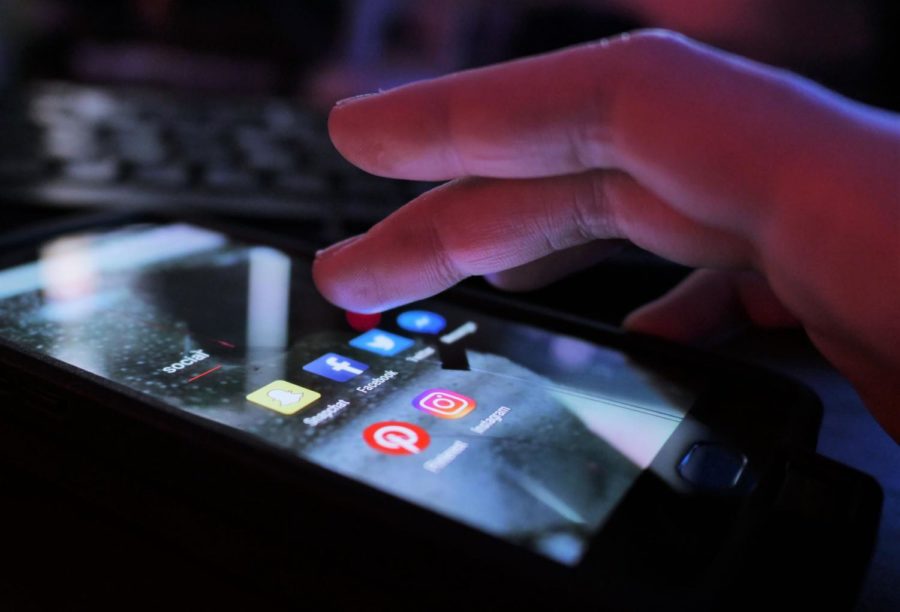Social media’s effect on students’ academic success, mental health
Google and Facebook have enormous economic and political power in society — especially over the news industry. Many ask if they have played a role in the misinformation that erodes our free press and plagues our democracy.
March 22, 2020
The effects of social media involve the success of students in college, based on how often they are using it in and out of the classroom.
Social media has significant impacts on the lives of Iowa State students every day, both good and bad.
Michael Wigton, associate teaching professor in the Greenlee School of Journalism and Communication, gave some insight into how the mental health of college students may be affected by social media.
“People [tend] to only post the positive things that are happening in their lives,” Wigton said. “It creates an illusion that you only live a constantly happy life.”
Wigton said people use social media only to show the most glamorous or exciting parts of their lives, using it to shield themselves from the negative parts of their day. He said looking at social media posts of his friends’ achievements and exciting lives makes him feel like he should be doing more in his own life.
When asked what methods he uses to lessen the distraction of social media in his classroom, Wigton said he requires his students to put away any electronic distractions and prefers that they write their notes on paper instead.
He explained that many times when students use computers for note-taking, he catches them checking their social media now and then.
“It happens all the time, and [occasionally] I even catch people trying to hide their phones from me to check their notifications,” Wigton said. “I see students in my class who unconsciously pick up their phone, even if they don’t have an alert, because there is a constant fear that they are missing out on something else that’s happening. They don’t even realize that they’re doing it anymore, and it’s become an involuntary act at this point.”
Wigton does use social media, however, in many of his class discussions to get the students more involved. During the Super Bowl, his class live-tweeted the whole game and, in the end, had around 600 comments from all of his students.
“It’s interesting to see what they like to read on social media, so I use those topics to get them more engaged in my discussions,” Wigton said.
Wigton mentioned an article by Neurotracker about a recent study on social media’s impact on the human brain. The study revealed goldfish have a nine-second attention span, while the average human attention span is only eight seconds.
Social media can take a toll on the mental health of students outside of the classroom. Students who check their phones frequently while studying tend to take longer to study than people who put their phones away and focus.
“Students who use their phone while studying tend to have less of a success rate on the test than those who can keep themselves from checking their notifications,” Wigton said. “Using your phone while studying takes away from how you process information.”
Jestene Moyer, sophomore in animal science, agrees that having her phone out while studying can be a major distraction.
“[When I study], I put my phone away because it’s distracting and, instead, listen to music to focus,” Moyer said. “I do tend to look at a lot of my media apps for a long time before bed, though.”
There are many things people can do to resist picking up their phone when studying or doing homework, such as shutting off notifications and alerts to limit the distractions. Wigton said people can limit the number of minutes that they are on social media each day through an app or parental controls. This allows only a certain allotment of time on each app before it shuts down the app for the day.
“This is a great way for students to stay focused because it keeps them from getting pulled into a wormhole of media posts,” Wigton said.
Abby Groen, sophomore in kinesiology and health, even went as far as trying a social media cleanse, deleting all of her media apps for a few weeks.
“I felt like I devoted way too much time on Instagram [and] Twitter, checking in on people’s status, and needed a break to have more time to spend with friends and family,” Groen said.” I wanted to focus on myself and my mental health.”
Groen said it was a great experience and said she felt like she had so much free time, but once she was back on social media again, she found it hard to stop from checking her notifications every few minutes. Groen said she is hoping to do a social media cleanse again soon.
For those who stay up to check their notifications before bed, doing so can throw off your REM cycle, which can cause restless sleep and suppression of melatonin, leading to exhaustion and irritability the next day.
Wigton said checking notifications every time they go off while trying to sleep can make it hard for students to have a well-rounded sleep schedule because their brain registers that the body should be alert and engaged, leaving that person wide-awake.

















